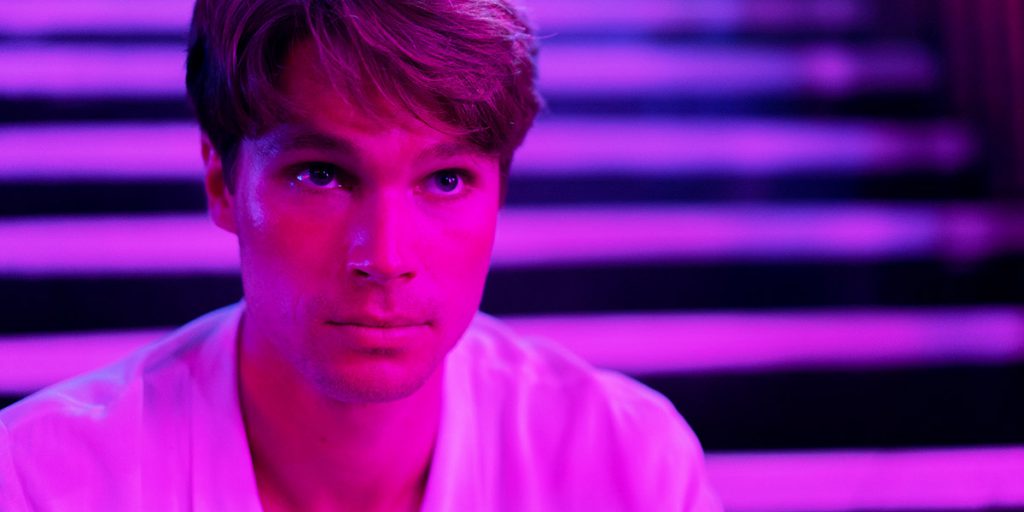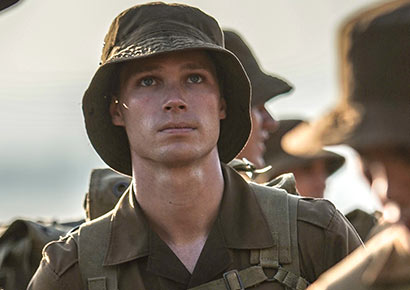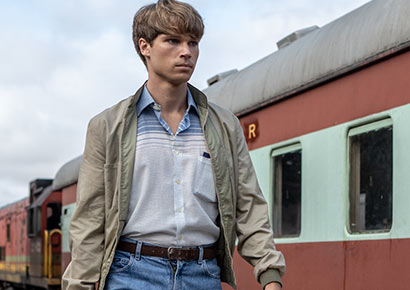Moffie Q&A: Star Kai Luke Brümmer

Kai Luke Brümmer stars as the lead character of Nicholas van der Swart in the acclaimed local queer film Moffie. But did you know that he initially auditioned for three different roles in the movie?
Brümmer began performing in theatre as a small child, in an old helicopter hanger that his mother transformed into a theatre space. Brümmer also took ballet lessons and trained as a circus acrobat. Later his mother went to film school and often took him with her to set. At the age of ten, he became passionate about film.
After high school – where Brümmer participated in all forms of performance – and an interlude as ringmaster in Boswell Wilkie’s Circus, he enrolled at the University of Cape Town. He graduated with a BA (Honours) in Theatre and Performance and was awarded a distinction in acting and the prize for best male actor.
In the relatively short time since finishing drama school Brümmer has performed in numerous stage productions, including The Curious Incident of the Dog in the Night-Time, for which he won a Naledi Award for best actor.
In 2017, Brümmer took part in the first round of casting for Moffie. Over the following year, he would audition for three different principal roles in the film before being chosen as Nicholas in late 2018.
Brümmer toiled tirelessly to prepare for the role, adopting a vigorous exercise and weight loss program, as well as working his way through a list of films that the director assigned as research. All the work paid off, with Brümmer receiving acclaim for his take on the closeted gay army conscript. He was also named one of two best new up-and-comers at the 76th Venice Film Festival by The Guardian.
MambaOnline spoke to Brümmer about his Moffie journey.
How did you get the part of Nicholas? Was it the part that you most wanted and why?
I started the audition process in November 2017 and after 11 auditions and a year of casting, I got the role of Nicholas. It was definitely the part that I wanted, as there was something in the quietness of Nicholas that intrigued me.

What were the connection points or similarities that you made with this character?
My father went to the army at the same time period as Nicholas, and this was my first connection to him. But, to be honest, Nicholas and myself are very different personalities.
How useful was it to read the book, Moffie (The film is based on André Carl van der Merwe’s memoir about his time in the army.)
The novel and the film are very different texts and so early on in my process, I broke away from the novel and focused on the script.
Nicholas is not much of a talker in the film. How challenging was it to communicate so much with so few words?
I think so much of acting is observing and listening, and so it was a huge privilege to speak as little as I did. It afforded me the opportunity to experience moments and sink into the realities of the scene.
Tell us about the physical preparation for the role? How demanding was it for you?
Oliver and I both agreed that Nicholas shouldn’t look like a strong person. So I started the process of weight loss and by the start of shooting I had dropped, I think it was, 11kgs.
The issue of LGBTQ characters being played by non-LGBTQ actors is a fiery one – with some claiming that queer actors should be getting these roles. What are your thoughts on this?
Nicholas, like all of us, is more than just his sexuality, even though that plays a crucial role in defining who he is. I agree that it is important for queer and other marginalised communities to represent themselves, especially since opportunities like this come by so seldom. On the other hand this acting and storytelling thing is about being able to reach beyond ourselves and find something real in people who may or may not be like us. It’s about recognising that we are all complicated. Three thousand people auditioned for the role, so I am very grateful to have had the opportunity to play him and I hope that I did justice to the many nuances of Nicholas’s experiences.
What insight into being a member of the LGBTQ community did you gain from playing the role?
I spent much of my childhood being called a moffie on the playground, because I did ballet. But, being called a moffie in 1981 South Africa, was a whole different story. A world in which being gay was by law a punishable offence. I can only imagine how terrifying this must have been. It’s easy to look at 1981 and think how far we have come. But, at the same time Nicholas’ experience of his sexuality and I guess sense of belonging is not one from a distant past, but one that people still experience today. So, it makes me question how far we as a culture have really come?

How much research did you do for the role? Were you very aware beforehand of what went on in the military at the time – and what surprised you?
I am a detail-oriented person and I love research. It became so important for me to understand this character from all perspectives. There wasn’t much that surprised me, but I suppose through the filming process, the weight of the time period and the indoctrination of the apartheid regime began to sink into my bones in a very uncomfortable way.
What, for you, would have been the most challenging part of being conscripted into the apartheid military?
I think I would have had an issue with most aspects of the Army. But, the one thing that always gets to me is the brutalisation of people of colour.
How did making Moffie change you? Did it change you or your perspectives in any way?
Moffie has changed the way I see myself, my heritage and the burdens that we as young South Africans carry with us each and every day.
Moffie is now screening in cinemas across South Africa. Read our interview with Moffie director Oliver Hermanus here.
Leave a Reply